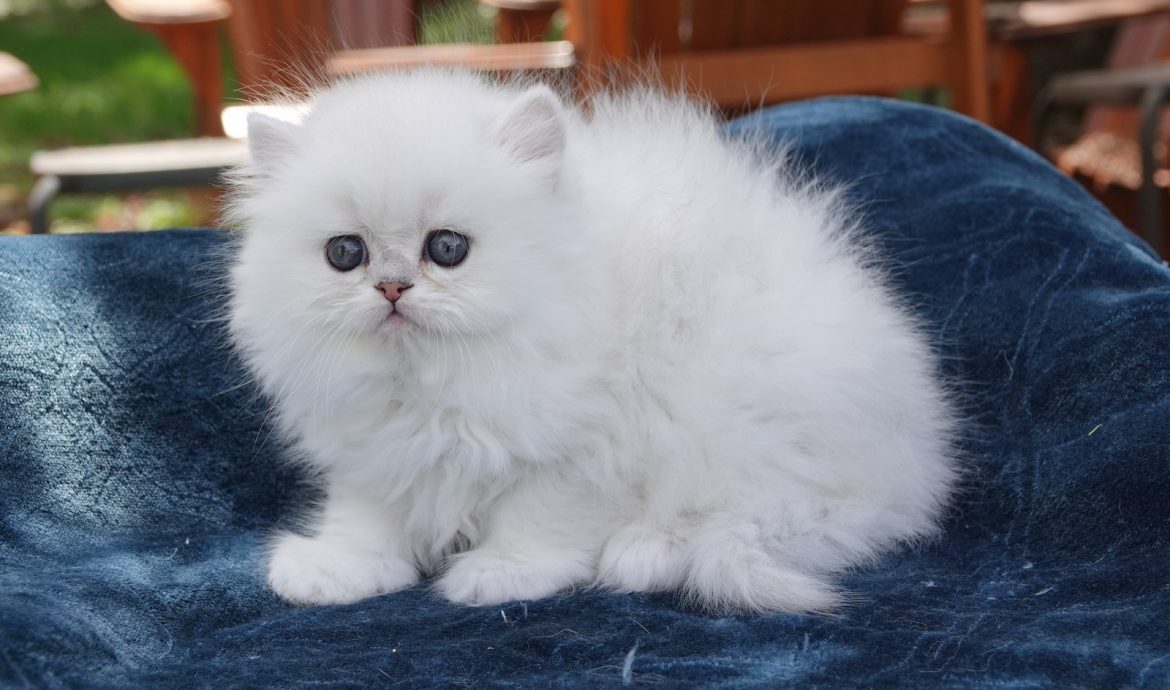
Behind the Scenes: Our Approach to Raising Exceptional Persian Chinchilla Kittens
Our Journey Through Time 
 From Airedale Terriers to Persian Silver Chinchillas
From Airedale Terriers to Persian Silver Chinchillas
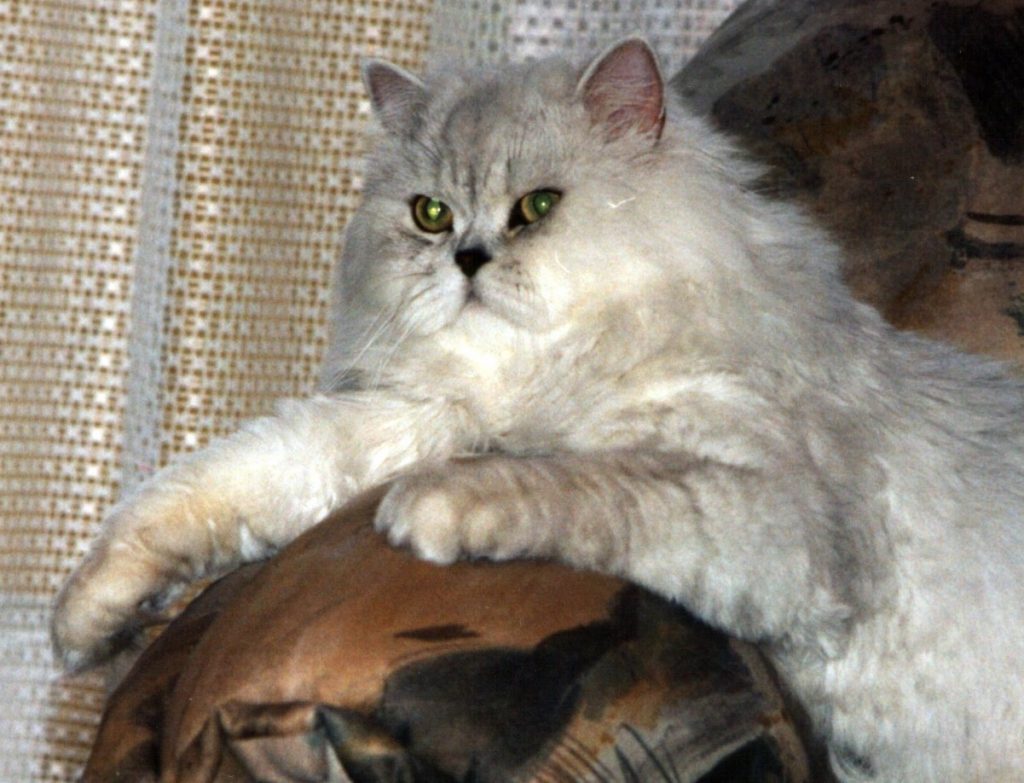
Our FIFE Inter Champion Archibald. Persian Silver Shaded 1997
It was in the 1980s back in Europe ![]() that we gained our vast expertise in showing, grooming, and training these magnificent dogs. However, in the 90s, our path took an unexpected turn. The passing of our Famous Champion Airedale Terrier, a cherished and beloved member of our family, led us to discover a new passion – Persian Silver Chinchilla Kittens.
that we gained our vast expertise in showing, grooming, and training these magnificent dogs. However, in the 90s, our path took an unexpected turn. The passing of our Famous Champion Airedale Terrier, a cherished and beloved member of our family, led us to discover a new passion – Persian Silver Chinchilla Kittens.
Since raising our first breeding pair, we have been committed to this exquisite breed. Our dedication was further solidified in 1997, a year marked by a special member of our family – our Inter Champion Archibald. This magnificent Persian Silver Shaded cat was not just a pet but a symbol of grace, beauty, and the excellence we strive for in our breeding endeavors. Archibald’s legacy continues to inspire us, and his memory is a constant reminder of the love and devotion we have for these beautiful animals.
The photos of our kittens dated back to 1997 are not just images; they are reflections of our commitment.
“Working hard for something we don’t care about is called stress: Working hard for something we love is called passion.”
―
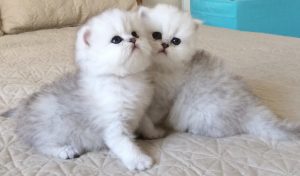
Our Twin baby sisters from 2014
Our adult cats and kittens have always been known for their gentle personalities and easygoing dispositions. By the time they are ready to join their forever homes, our kittens are exceptionally well-socialized. Below are some highlights from the feedback we’ve received, showcasing the endearing characteristics of our kittens:
” the sweetest cat I have ever had” “gentle and loving” “respond to us in a loving way” “I couldn’t be more pleased with her” “truly a delight in every way”
We are proud to share just one of the many heartwarming testimonials we receive from the owners of our kittens:
“How do we tell you how perfect these kittens are? They are friendly, beautiful, smart – absolutely perfect in every way. They were shy for a few hours but then came out to play with my daughters. The fluffy one, Ophelia, is so chatty! She is braver and really really plays! Runs around chasing for awhile! The smaller more gray girl, Luna, is more timid and follows her sister but loves playing more so on her own and is great to watch. They sleep on top of each other and stick together. We are over joyed. We had a few visitors who can’t believe their beauty and how smart and good manners they have. My cousins and aunt and uncle are asking about your info for next litter! I didn’t think I would be in touch with you so soon but had to tell you already how great they are – and it’s still just the second day! ”
Our Persian Chinchilla kittens are known for their robust health, affectionate nature, and love for human companionship. Intelligent and adaptable, they easily fit into various home settings, including those with children. Playful yet serene, they enjoy both interactive and quiet times, and are particularly suited to peaceful environments.
While they form strong bonds with family members, they may be initially cautious around strangers but often warm up quickly, displaying a friendly demeanor to all. These kittens are perfect for families, being gentle with children and coexisting well with other pets.
Persian Chinchillas are content both in the company of their owners and on their own, making them ideal for various lifestyles. When left alone, they prefer the comfort of their familiar home environment, making them well-suited for owners who may occasionally travel.
Tracking the Journey: Kittens’ Development in Our Care Since Birth
Understanding the fragility of kittens at the moment of birth is crucial, as it underscores the significance of caring for newborns and their mother. This care ensures that the kittens transition to their new homes in good health, with stable temperaments, and well-socialized behaviors.
During their time in our care, we closely monitor the development of kittens from birth onward. It’s essential to comprehend the journey they undergo from the moment they enter the world.
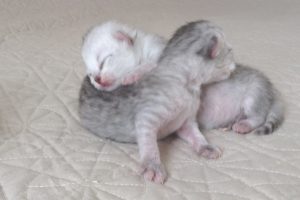
Our two day young newborn babies
Between 7 to 9 weeks old, kittens start running and actively playing with their litter mates. At 8 weeks of age, they are old enough to visit the vet. During this visit, they will receive their first set of shots and undergo a veterinary examination. We closely monitor them for possible side effects from vaccination after their first dose to ensure any minor side effects have faded by the time they move to their new homes.
Kittens should stay with their mother for at least eight weeks from birth so they can get the full benefit of the mothers’ milk, which contains important antibodies. This is the rationale behind many regulations that prohibit the sale or adoption of animals under the age of eight weeks. The mother cat’s milk not only provides all the protein, fat and vitamins a kitten needs to grow strong and healthy, but also the elements necessary to build a strong immune system. Mother’s milk contains colostrum, a nutrient-rich substance that carries with it all the immunity a healthy mother cat has built up. Normally, the colostrum phases out by about the third or fourth day of nursing. Full eight weeks of nursing help kittens grow strong and healthy, benefiting from the natural antibodies and high nutrition delivered through nursing.
At 9 weeks of age the kittens are ready to go to their new homes. While we do everything we can to give them the right exposures and socialization it is up to the new owners to continue this training so the kitten grows up to be well-socialized and confident.
Socialization: Kittens go through a critical learning phase between the ages of 2 to 7 weeks, called the sensitive period of socialization. During this time, kittens learn to accept contact with other species, such as dogs and humans, as well as unrelated cats. Kittens who have not received regular friendly handling by humans during 2 – 7 weeks of age may remain uneasy with human contact all their lives.
Deworming: Since intestinal parasites (eg, roundworms, hookworms, and tapeworms) are common in kittens, all kittens are treated with drugs to kill these parasites from 4 to 7 weeks of age. We deworm our kittens with total four doses of 1/2 ml STRONGID given to each kitten from 5 weeks of age one week apart. You will need to discuss further the deworming needs of your kitty directly with your vet after adopting from us. Deworming should become a part of your kitty annual routine visit to your vet.
Veterinarian and Vaccination Choice: Our chosen veterinarian is highly valued for their use of PUREVAX®, the only fully adjuvant-free feline vaccine available. We prioritize this vaccine due to its safety profile for cats and kittens, offering protection with minimal side effects. This choice aligns with our commitment to the health and well-being of our cats. Our breeding cats have consistently maintained a clean health record, reflecting our dedication to their ongoing health and wellness.
At about 8 weeks of age, we vaccinate our kittens with first dose of FVRCP Feline 3 vaccine. After first dose of vaccine is given, kitten should be re-vaccinated every 3 to 4 weeks, and the last dose should be given at or over 12 weeks of age. The FVRCP vaccination is an important part of your cat’s routine for the lifetime. It prevents three potentially deadly airborne viruses: rhinotracheitis, calicivirus and panleukopenia.
Rhinotracheitis is triggered by the common feline herpes virus. Symptoms include sneezing, a runny nose and drooling. Your cat’s eyes may become crusted with mucous, and he or she may sleep much more and eat much less than normal. If left untreated this disease causes dehydration, starvation, and eventually, death.
Calicivirus has similar symptoms, affecting the respiratory system and also causing ulcers in the mouth. It can result in pneumonia if left untreated—kittens and senior cats are especially vulnerable.
Panleukopenia is also known as distemper and is easily spread from one cat to another. Distemper is so common that nearly all cats—regardless of breed or living conditions—will be exposed to it in their lifetime. It’s especially common in kittens who have not yet been vaccinated against it, and symptoms include fever, vomiting and bloody diarrhea. This disease progresses rapidly and requires immediate medical attention. Without intervention, a cat can die within 12 hours of contracting the disease.
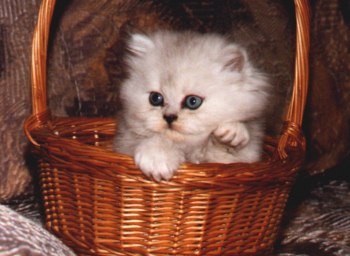
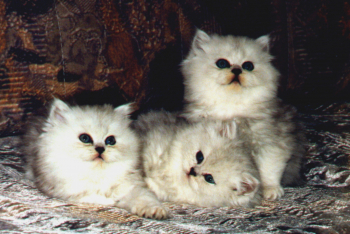
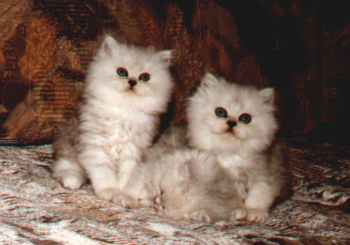
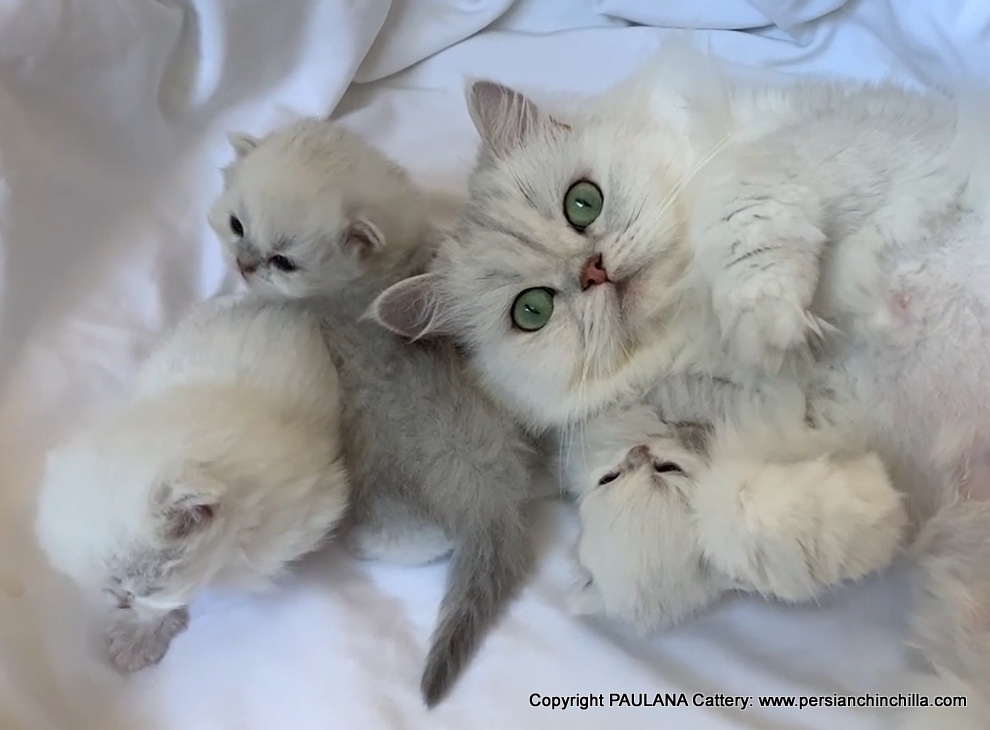 Between 5 to 6 weeks old, kittens begin to transition to solid food while still nursing from their mother. They become more engaged in playful activities with their litter mates and consistently use the litter box.
Between 5 to 6 weeks old, kittens begin to transition to solid food while still nursing from their mother. They become more engaged in playful activities with their litter mates and consistently use the litter box.